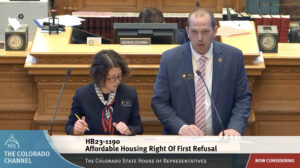Sponsors of a 2023 bill vetoed by Gov. Jared Polis that would have given local governments a right of first refusal on buying for-sale apartment complexes returned Tuesday with a pared-down version focused more on letting governments make a first offer on properties.
House Bill 1175, authored again by Democratic Reps. Andy Boesenecker of Fort Collins and Emily Sirota of Denver, is a response to Colorado’s housing affordability crisis, with backers saying it will permit preservation of units with already below-market rents. While the level of opposition is less than last year because the right of first refusal would apply to only about 1,400 properties, a half-dozen business groups still warned that the new provisions would slow transactions and chill needed investment in new housing.
The House Transportation, Housing and Local Government Committee advanced HB 1175 to the House floor by an 8-3, Democratic-led party-line vote, and Boesenecker said he expects more changes to the already rewritten proposal as negotiations continues. While majority Democrats once again are rallying around the plan, which would create the first statewide right of first refusal for cities and counties, it remains unclear whether the changes are enough to win Polis’ support.
Difference from 2023 right-of-first-refusal bill
Where last year’s plan proposed a right of first refusal for all properties of certain sizes and ages that hit the open market, HB 1175 bifurcates affected apartment complexes into two barrels. It would create a right of first refusal on properties going up for sale that already have affordability restrictions, and it would create a right of first offer for local governments on complexes at least 30 years old that contain five to 100 units in urban areas or three to 100 units in rural and resort areas.
Local governments using the right of first refusal would have 14 days to decide upon notice of an apartment sale whether to preserve that right, 60 more days to make an offer and 120 days to close on the sale. While the bill allows extension of timelines if inspections or appraisals are delayed through no fault of the government, it requires governments to put up earnest money up to $100,000 that can be held in escrow and forfeited if they back out on the deals.
Those governments employing the right of first offer, meanwhile, must be told of a coming sale of qualified properties and given 14 days to claim their right, after which they would get 45 days of due diligence to put in an offer. The seller can reject that offer, but if it is accepted, the government then has 60 days to close the transaction.
Why supporters believe it’s necessary
About 5,100 rental homes statewide aged out of affordability restrictions over the past 10 years and another 14,500 are slated to do the same in the next decade, said Kinsey Hasstedt, state and local policy director for Enterprise Community Partners. Meanwhile, about 374,000 Colorado rental units are in properties below 50 units, meaning there are many properties that are ripe for preservation by local governments and potential nonprofit partners under the proposed new law.
Bill supporters include local-government organizations such as the Colorado Municipal League and Counties & Commissioners Acting Together. Larimer County Commissioner Jody Shadduck-McNally said it would help to even a playing field now tilted toward investors who may snatch up a property before a government knows it’s on the market and then boost rents after making improvements.

Colorado state Reps. Emily Sirota and Andy Boesenecker discuss their bill to create a right of first refusal for local governments in most apartment sales during the 2023 session.
“What does it mean for the state of Colorado when folks we need to work in our state can no longer afford to live here?” Boesenecker asked committee members. “What does it mean when our kids can no longer go to the same school because their apartment building is sold and it’s no longer affordable for their family? What does it mean for our teachers who can no longer afford to teach and live in the same communities where they work?”
Pushback from business interests
But representatives from the apartment-management, property-ownership and construction communities asked what it might mean if Colorado enacted restrictions that staunched the flow of capital to the state at a time when it needs to build more housing. And they warned that provisions in HB 1175 would do just that.
Timeframes permitted in the bill are too lengthy — particularly the 60 days for a government claiming right of first refusal to make an offer — when deals now can close in weeks, said Allison Morgan, Colorado Bankers Association director of state government affairs. Investors already have begun saying that any encumbrance will lead them to look to put their money in other states where they, rather than governments, control the destiny of their properties, said Caitlin Quander, president of NAIOP Colorado.
Boesenecker said he expects local governments to use the right of first refusal on a very small number of properties and to employ the right of first offer only on “naturally occurring affordable housing” like older complexes with depreciated values.
Andrew Hamrick, general counsel for the Colorado Apartment Association, argued, however, that the only right the bill should grant is for first offer, and that should be limited to properties already renting for below-market rates. Otherwise, the bill allows local governments to slow down the sales processes for market-rate properties that they won’t be able to buy anyway, and that will send construction investment to other parts of the U.S.
Right-of-first-refusal bill just one of many housing proposals
“Not only does this depress the existing value of Coloradans’ property, but it retards the flow of national capital into the state,” Hamrick warned.
The bill is one of many proposals put forth by legislators this year to try to address the state’s affordability crisis.
It is not, however, part of the package of bills being touted by Polis, which include a proposal to allow owners of urban single-family residences to build accessory dwelling units and a bill to ban local limits on the number of unrelated people living in a house. The lynchpin of that package — a previously detailed measure that would require local governments to increase density in areas around transit lines or face loss of roadway funding — received introduction Tuesday as HB 1313.
In vetoing last year’s right-of-first-refusal bill, the Democratic governor wrote that it could “discourage investment at a time when the market cannot bear much risk.” He wrote that he supported local governments’ ability to buy such properties on the open market and preserve low-cost housing but said he does not support “a required right of refusal that adds costs and time to transactions.”
